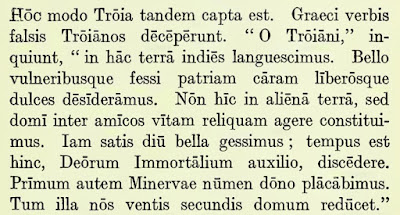A quick reminder: all of my posts since 02.05.24 have been
based on this video:
https://www.youtube.com/watch?v=nY1FVZ9fUl8
Almost everything that Vincent said on that video has been
used for review.
Note the two words in block capitals in the text:
Hōc modō Troia tandem capta est. Graecī verbīs
falsīs Troiānōs dēcēpērunt. "Ō Troiānī," inquiunt, "in hāc terrā
in diēs languēscimus. Bellō vulneribusque fessī patriam cāram līberōsque dulcēs
dēsīderāmus. Nōn HĪC in aliēnā terrā, sed domī inter amīcōs
vītam reliquam agere cōnstituimus. Iam satis diū bella gessimus; tempus
est HINC, Deōrum Immortālium auxiliō, discēdere. Prīmum autem
Minervae nūmen* dōnō plācābimus. Tum illa nōs ventīs secundīs
domum redūcet."
[In this way Troy was finally taken. The
Greeks deceived the Trojans with false words. "O Trojans," they said,
"we have been languishing in this land day after day.
Tired of war and wounds, we long for (our) dear country and sweet children.
Not HERE in a foreign land, but at home among friends, we have
decided to spend the rest of our lives. We have fought wars long enough; it is
time to depart FROM HERE with the help of the immortal gods.
But we will first appease the divine will of Minerva with a gift. Then she will
bring us back home with favourable winds."]
*nūmen, nūminis [3/n] its basic meaning is a ‘nod of the
head’ but very often when the gods are involved it refers to divine
will.
Notes:
[1] Google translate alert!
Beware the Greeks bearing gifts.
Beware Google giving translations.
What it is: Tum illa nōs ventīs secundīs domum
redūcet. │ Then she will bring us back home with favourable winds.
What Google Translate thinks it is: Then
she will bring us home in twenty seconds.
[2] in hāc terrā in diēs languēscimus │
we have been languishing in this land
day after day
French and German speakers will get this straight away:
I’ve been living here /
I’ve lived here for three years (and I still am).
Fr: J’habite ici depuis trois ans; Gmn: Ich wohne seit drei
Jahren hier; both French and German (and Russian) literally express this by
using a present tense i.e. I am living here since three years.
Russian often uses uzhe (already) with a present tense to
convey that.
Latin does the same; it uses a present tense often
with iam (already) or other expression of time to express an
action that started in the past and is still happening:
in hāc terrā in diēs languēscimus │
we have been languishing in this land
day after day [literally: we are languishing in the land day after day (and we
still are)]
There is no separate Latin verb form that expresses the
English “have been doing something”.
[3] In the video, Vincent said:
Et vidētur frāter meus illīc │ And my
brother is seen / can be seen over there.
hīc and illīc
[i] vocabulary lists sometimes miss the spelling difference:
hīc – with long /ī/ - means ‘here’
[ii] illīc: (over) there
There is a little ‘bunch’ of these which you need to be able
to recognise; it’s best to visualise them and so they are posted with images
because they have “fussy” differences which aren’t always easy to remember!
Here they are listed with examples, but the only way I could
recall them was to visualise them; check the image.
[1]
hīc: here
hūc: to here (in older English we used to say hither)
hinc: from here
[2]
illīc: (over) there
illūc: to there (in older English we used to say thither)
illinc: from there
From the texts:
Nōn hīc in aliēnā terrā, │ Not here in
a foreign land …
tempus est hinc … discēdere. │ It is time
to depart from here …
From the video:
Et vidētur frāter meus illīc │ And my
brother is seen / can be seen over there.
Further examples from the authors:
[1]
Hīc semper in lūctū manēbō (Gesta Rōmānōrum) │ I
shall always remain here in mourning.
Vāde, vocā virum tuum, et venī hūc.
(Vulgate)│Go, call your husband and come (to) here.
Abī hinc(Livy) │ Go away from here …
[2]
Illīc sum atque hīc sum.
(Plautus) │I’m here and there.
Saepe tamen illūc ībat (Gesta Rōmānōrum) │
However, he would still often go (to) there.
num … mulier illinc vēnit? (Plautus)
│Hasn’t the woman come from there?









